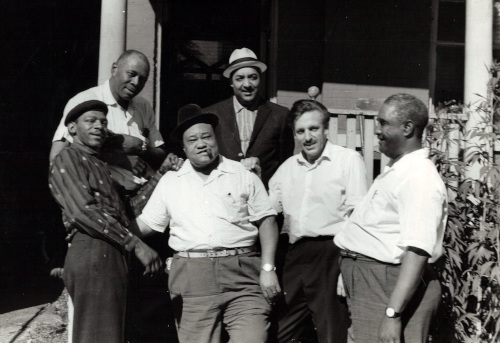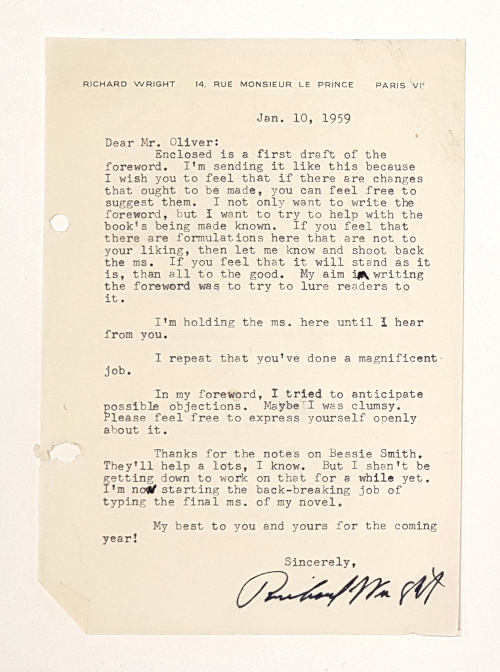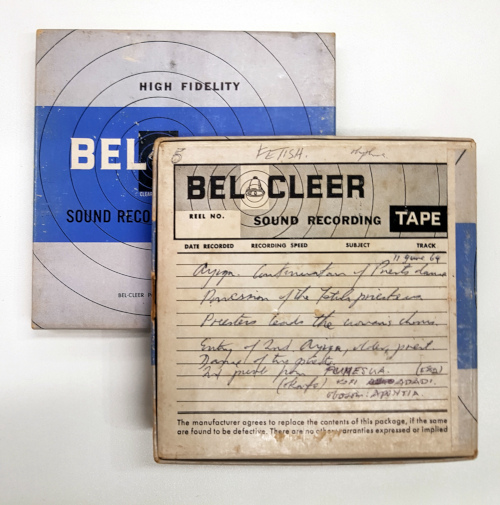Archives Hub feature for November 2021
The flourishing of the commercial music industry in early twentieth-century America enabled people thousands of miles away in Europe to hear the new and previously unimagined sounds of jazz and blues. Carried over the Atlantic in the form of 78 rpm shellac records – many of them brought by US servicemen during the Second World War – they became an object of obsession for collectors, some of whom sought to learn more about the lives behind the names on the disc labels. One such collector was Paul Oliver (1927-2017), who would go on to become one of the foremost authorities on the history of blues music, publishing such books as Blues Fell This Morning (1960) and The Story of the Blues (1969).

As a white Englishman, he was, as he wrote, ‘acutely aware of my remoteness from the environment that nurtured the blues’, but he made it his mission to try and understand that environment, encouraged early on by meetings in Paris with the black American writer Richard Wright (who wrote a foreword to Blues Fell This Morning). Oliver did not actually set foot in America until 1960, when with the aid of a US embassy grant and BBC sound equipment, he managed to interview some 70 blues musicians and associated figures, whose transcribed voices would form the basis of the documentary book Conversation with the Blues (1965).
The original tapes of those interviews, along with correspondence with Wright, now form part of the Paul Oliver Archive of African-American Music, based in the library of Oxford Brookes University (where Oliver taught architecture for many years). The collection is in the process of being catalogued with the support of the European Blues Association and an Archives Revealed cataloguing grant. The interviews – and the bulk of Oliver’s papers – have already been catalogued, but there are over a hundred other digitised audio tapes still to go. Most of these are compilations of obscure blues songs dubbed from 78s in the early 1960s; though nowadays such material can be accessed via streaming services (thanks to reissue labels such as Document and Yazoo), the original tracklists help situate Oliver in a network of collectors engaged in intensive discographical research.
There is a tendency now to view blues retrospectively through the prism of its influence on rock music, something Oliver in his later years remained unhappy about: ‘the perception of Robert Johnson as being the grandfather of rock, has led to a peculiar kind of history… which channels everything from Mississippi through a very narrow group of people’. Oliver was drawn to more overlooked performers, admitting to an initial bias towards those with distinctive nicknames: ‘Lightnin’ [Hopkins] or Peetie Wheatstraw were not the names you’d normally come across, so to speak, where a name like Tommy Johnson or Robert Johnson would just sound like the guy next door’. Ironically, this eye for names led to Oliver playing an indirect role in rock history, as it was his allusion in a set of liner notes to the little-known bluesmen Pink Anderson and Floyd Council that reputedly gave the young Syd Barrett the idea to name his band Pink Floyd.
The world Oliver inhabited was still one of paper, analogue media, and a dependence on the postal system. For over a decade he worked on a long-distance project about Texas blues with the eccentric American folklorist Mack McCormick, who sent him tapes of gospel services and Mexican Tejano music recorded from Houston radio, turning up so much material that a comprehensive account remained forever out of reach. A desire to trace the roots of the blues to Africa also led Oliver on a field trip to Ghana, where he made several recordings in 1964. These tapes now sit alongside boxes of handwritten lyric transcriptions, typewritten discographies, research cuttings, and visual memorabilia, all testament to a lifetime spent attempting to understand ‘the relationship between the music, the song and the community’.
A selection of Oliver’s photographs from the 1960 US trip – along with audio clips from some of the interviews – can now be viewed in an online exhibition hosted by Oxford Brookes Special Collections. Lower-level catalogue descriptions will be added to the Archives Hub as the project progresses; a collection-level record can be accessed here.
References
David Horn, Interview with Paul Oliver (2007)
Christian O’Connell, Interview with Paul Oliver (2009)
Paul Oliver, ‘Author’s note’ to Blues Fell This Morning (1960)
Fabian Macpherson
Blues Off the Record Project Cataloguer
Oxford Brookes University Special Collections and Archives
Related
Paul Oliver Archive of African American Music (19th-20th centuries) collection description
Browse all Oxford Brookes University Special Collections and Archives descriptions on the Archives Hub.
All images copyright Oxford Brookes University Special Collections and Archives. Reproduced with the kind permission of the copyright holders.




